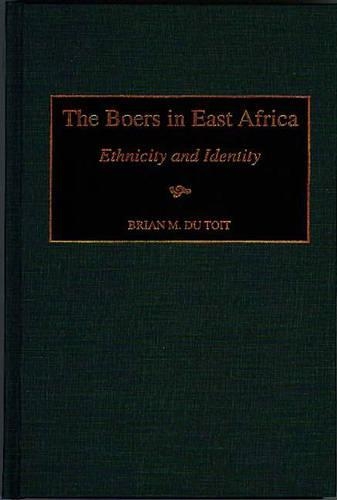
The Boers in East Africa: Ethnicity and Identity
(Hardback)
Publishing Details
The Boers in East Africa: Ethnicity and Identity
By (Author) Brian M. du Toit
Bloomsbury Publishing PLC
Praeger Publishers Inc
28th October 1998
United States
Classifications
Tertiary Education
Non Fiction
African history
Anthropology
Other Nonconformist and Evangelical Churches
967.60043936
Physical Properties
Hardback
224
Width 156mm, Height 235mm
510g
Description
At the end of the Anglo-Boer War in May 1902, the defeated Boers emigrated en masse out of South Africa. They had three diverse destinations: a large group went to Argentina, a smaller group to the American southwest (Mexico and the Texas-New Mexico border area), and a third group to East Africa. In both the large migrations, to Argentina and East Africa, the different denominations of the Dutch Reformed Church established congregations and sent dominees (ministers), who were regularly replaced by new dominees fresh from South Africa. The dominees became important agents in the preservation of Afrikaner ethnicity and instruments in return migrations, decades later, of Afrikaans speakers to South Africa.
Reviews
"[A] true scholarly treasure. It will be welcomed by historians of the Afrikaner people and of East Africa alike, and should be read with profit by students of ethnic diasporas world wide. This is impressive, well-documented micro-history, meticulously carried out by a South African-born scholar whose academic and personal qualifications for undertaking it are close to unique."-Newell M. Stultz, Professor of Political Science Brown University
"Brian du Toit's maturity as a fieldworker and his sensitivity to Afrikaner cultural nuances combine to provide an engrossing historical anthropology of a little known aspect of the Afrikaners which provides important insights into not only Afrikanerdom and diaspora studies, but settler colonialism in East Africa as well."-Robert J. Gordon, Professor of Anthropology and African Studies University of Vermont
"This is to my knowledge the first book that deals with [Afrikaners] as settler communities outside South Africa. The author, himself an Afrikaner, has carried out detailed historical research using archives, church and family records, and memories held by those still living. I doubt whether a non-Afrikaner could have done this work....The accounts given here make fascinating and important reading."-John Middleton Professor of Anthropology and Religious Studies Emeritus Yale University
"Du Troit's stimulating methodology will be of interest to students, Africanists and planners. [It is] a landmark work, obligatory reading for anyone interested in the evolution of social sciences in general. Du Troit gives us a very clear and cogent case for Boers Machiavellianism. His book is a must read for students of East African history and of colonization and decolonization in Africa in general and East Africa in particular. It will appeal to a large audience because the text is lively....The Boers of East Africa is an epic saga of excitement. I highly recommend it to a wider audience and Africanists in particular."-International Migration Review
[W]hile it is not the first scholarly treatment of Afrikaner settlements in German and British East Africa, it can confidently claim to be the most comprehensive.The book provides a convincing analysis of why Afrikaners moved to East Africa, particulary after the South African War of 1899-1902. This is followed by a detailed description of the trails and tribulations of an immigrant community which formed a minority within a white community of approximately 70,000 settlers in African territory under foreign rule.[T]he author's dogged research and keen eye for detail have produced a book likely to become standard reading in the field.-African History, Vol. 44
Du Troit's stimulating methodology will be of interest to students, Africanists and planners. [It is] a landmark work, obligatory reading for anyone interested in the evolution of social sciences in general. Du Troit gives us a very clear and cogent case for Boers Machiavellianism. His book is a must read for students of East African history and of colonization and decolonization in Africa in general and East Africa in particular. It will appeal to a large audience because the text is lively....The Boers of East Africa is an epic saga of excitement. I highly recommend it to a wider audience and Africanists in particular.-International Migration Review
"While it is not the first scholarly treatment of Afrikaner settlements in German and British East Africa, it can confidently claim to be the most comprehensive.The book provides a convincing analysis of why Afrikaners moved to East Africa, particulary after the South African War of 1899-1902. This is followed by a detailed description of the trails and tribulations of an immigrant community which formed a minority within a white community of approximately 70,000 settlers in African territory under foreign rule.The author's dogged research and keen eye for detail have produced a book likely to become standard reading in the field."-African History, Vol. 44
"[W]hile it is not the first scholarly treatment of Afrikaner settlements in German and British East Africa, it can confidently claim to be the most comprehensive.The book provides a convincing analysis of why Afrikaners moved to East Africa, particulary after the South African War of 1899-1902. This is followed by a detailed description of the trails and tribulations of an immigrant community which formed a minority within a white community of approximately 70,000 settlers in African territory under foreign rule.[T]he author's dogged research and keen eye for detail have produced a book likely to become standard reading in the field."-African History, Vol. 44
Author Bio
BRIAN M. du TOIT is Professor of Anthropology at the University of Florida, Gainesville.
